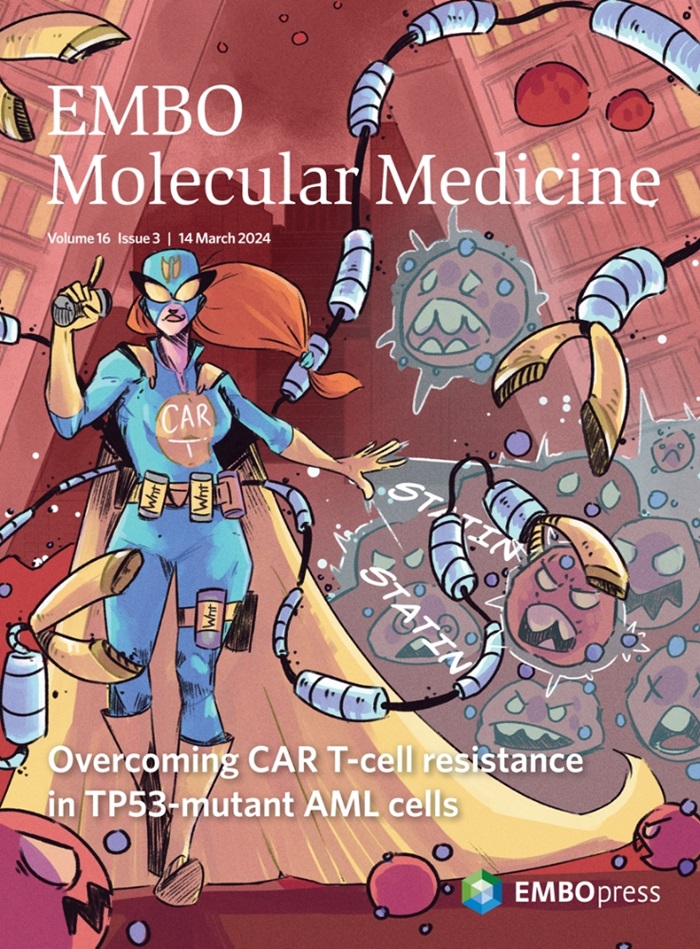异黄芪素通过pink1 - parkin依赖的线粒体自噬在动物和患者iPSC模型中拮抗ALS病理。
IF 8.3
1区 医学
Q1 MEDICINE, RESEARCH & EXPERIMENTAL
引用次数: 0
摘要
线粒体损伤引发线粒体功能障碍相关的衰老,这被认为是肌萎缩性侧索硬化症(ALS)的关键原因。因此,有丝分裂消除受损线粒体为ALS治疗提供了一个有希望的策略。本研究通过筛选大量天然化合物文库(n = 9555),我们鉴定出来自银杏的生物类黄酮异银杏素(isoinkgetin, ISO)是一种强效的特异性线粒体自噬诱导剂。ISO通过稳定PINK1/TOM复合体来增强PINK1-帕金森依赖性的有丝分裂。从翻译的角度来看,ISO在秀丽隐杆线虫和小鼠模型中拮抗ALS病理;有趣的是,在三种ALS患者来源的诱导多能干细胞系统(C9、SOD1和TDP-43)中,ISO可改善线粒体功能并拮抗运动神经元病变,这突出了其在不同遗传背景的ALS患者中的潜在广泛应用。在分子水平上,ISO以PINK1-Parkin依赖的方式抑制ALS病理,因为PINK1或Parkin的消耗或抑制会减弱其益处。这些结果支持了线粒体功能障碍是ALS病理驱动因素的假设,线粒体自噬缺陷是ALS的可药物治疗靶点。本文章由计算机程序翻译,如有差异,请以英文原文为准。
Isoginkgetin antagonizes ALS pathologies in its animal and patient iPSC models via PINK1-Parkin-dependent mitophagy.
Damaged mitochondria initiate mitochondrial dysfunction-associated senescence, which is considered to be a critical cause for amyotrophic lateral sclerosis (ALS). Thus, mitophagic elimination of damaged mitochondria provides a promising strategy in ALS treatment. Here, through screening of a large natural compound library (n = 9555), we have identified isoginkgetin (ISO), a bioflavonoid from Ginkgo biloba, as a robust and specific mitophagy inducer. ISO enhances PINK1-Parkin-dependent mitophagy via stabilization of the PINK1/TOM complex. In a translational perspective, ISO antagonizes ALS pathology in C. elegans and mouse models; intriguingly, ISO improves mitochondrial function and antagonizes motor neuron pathologies in three ALS patient-derived induced pluripotent stem cell systems (C9, SOD1, and TDP-43), highlighting a potential broad application to ALS patients of different genetic background. At the molecular level, ISO inhibits ALS pathologies in a PINK1-Parkin-dependent manner, as depletion or inhibition of PINK1 or Parkin blunts its benefits. These results support the hypothesis that mitochondrial dysfunction is a driver of ALS pathology and that defective mitophagy is a druggable therapeutic target for ALS.
求助全文
通过发布文献求助,成功后即可免费获取论文全文。
去求助
来源期刊

EMBO Molecular Medicine
医学-医学:研究与实验
CiteScore
17.70
自引率
0.90%
发文量
105
审稿时长
4-8 weeks
期刊介绍:
EMBO Molecular Medicine is an open access journal in the field of experimental medicine, dedicated to science at the interface between clinical research and basic life sciences. In addition to human data, we welcome original studies performed in cells and/or animals provided they demonstrate human disease relevance.
To enhance and better specify our commitment to precision medicine, we have expanded the scope of EMM and call for contributions in the following fields:
Environmental health and medicine, in particular studies in the field of environmental medicine in its functional and mechanistic aspects (exposome studies, toxicology, biomarkers, modeling, and intervention).
Clinical studies and case reports - Human clinical studies providing decisive clues how to control a given disease (epidemiological, pathophysiological, therapeutic, and vaccine studies). Case reports supporting hypothesis-driven research on the disease.
Biomedical technologies - Studies that present innovative materials, tools, devices, and technologies with direct translational potential and applicability (imaging technologies, drug delivery systems, tissue engineering, and AI)
 求助内容:
求助内容: 应助结果提醒方式:
应助结果提醒方式:


